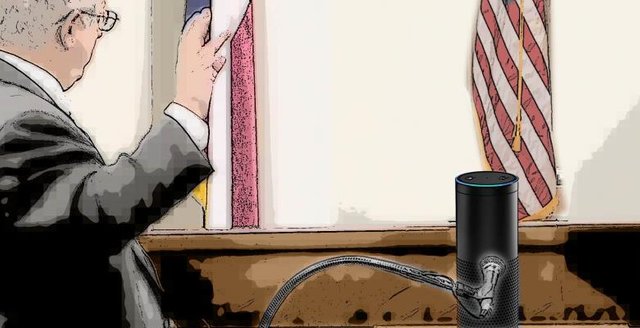Amazon Echo Murder Case Confirms Fears, But Upside Hard to Deny

If I were to ask you whether you would prefer a murder to be solved, or if you would rather have it remain unresolved, which option would you choose?
Assuming you are a compassionate human being, and not the perpetrator of the homicide, the answer is clear: solve the murder, lock up the murderer, and grant some measure of closure for the victim’s family and friends.
With this in mind, the revelation that an Amazon Echo device may be a critical tool in solving a murder should be greeted with a resounding “hurrah!”, right?
Sure. It’s great news.
But there are also other, understandable reactions to the headline ‘Judge orders Amazon to turn over Echo recordings in double murder case’. Two reaction that will undoubtedly arise are confusion and apprehension.
After all, we’ve been told that Alexa, the all-knowing voice-control system, doesn’t listen to us unless we issue her a command. But, several incidents have planted the seeds of doubt in customers as to whether Alexa is really minding her own businesses when Amazon claims that she is.
There was the Oregon couple who discovered that their Amazon Echo was sending off recordings of their conversations to one of the husband’s employees. According to Amazon, Alexa ‘ woke up due to a word in background conversation sounding like ‘Alexa,’ then ‘“the subsequent conversation was heard as a ‘send message’ request. At which point, Alexa said out loud ‘To whom?’ At which point, the background conversation was interpreted as a name in the customer’s contact list.’
If it seems to be a far-fetched explanation for an unnerving occurrence, you wouldn’t be alone in your sentiment. Considering that headlines from mainstream publications include ‘Alex is Listening. Here’s How to Keep Your Voice Assistant from Recording You’ and ‘6 ways to keep Alexa from eavesdropping on you’, it’s understandable if you’re not exactly comfortable talking mess about your coworker or expounding on your deepest fears within earshot of your voice assistant.
Regardless of these seemingly unequivocal claims that Alexa is, in fact, eavesdropping when you don’t suspect, Amazon has maintained time and again that it is not listening to you, and that there are perfectly reasonable explanations for each instance that would seem to indicate otherwise.
The recent report that Alexa could be used to help solve a murder is yet another circumstance that will require some clarification. As laudable as a solved murder is, the way in which an Amazon Echo has made its way into the story brings up the oft-occurring question: is Alexa always listening, or isn’t (she)?
After all, one has to imagine that the alleged murderer didn’t blurt out ‘Alexa, record me as I commit a double murder’ before brutally taking the lives of two women. Yet, in spite of this extreme unlikelihood, the search warrant obtained by TechCrunch in the Farmington, New Hampshire homicide investigation states that ‘there is “probable cause to believe” that the Echo picked up “audio recordings capturing the attack” and “any events that preceded or succeeded the attack.”’
Other details of the case also open the possibility that legal lines will be crossed that, regardless of the heinousness of the crime, probably shouldn’t be, at least for precedent’s sake. Namely, the ability to search any device that was connected to the voice assistant during the period preceding and during the time that a criminal act was allegedly perpetrated.
‘Amazon is also directed to turn over any “information identifying any cellular devices that were linked to the smart speaker during that time period,” the order said.’ (TechCrunch)
Arguments can be made both ways. There’s no denying that solving a homicide is critically important for several reasons. To argue legal semantics as a means to hindering an investigation is to come off as heartless. After all, reliance on the Echo was at least partially responsible for the ultimate arrest of Dover, NH resident Timothy Verrill, who awaits trial on two charges of murder.
But the age of ever-present microphones in our lives, and in our homes, brings up a number of legal questions and shakes the belief in assertions that our voice assistants are only listening when we believe them to be. And, the New Hampshire murder case is not the first time that the Echo has been used as evidence in criminal investigations and trials.
In April 2017, James Bates’ attorney advised him to legally hand over transcripts of recordings from his Amazon Echo device after the Arkansas man was accused of murdering his friend. The case was eventually dismissed based on lack of sufficient evidence and plausible alternative explanations for Victor Collins’ death. In the United Kingdom, police are busy exploring the ways in which personal assistants can be used in aiding law enforcement.
In the face of a changing technological landscape, citizens should be made aware of how their devices are functioning, what they are or aren’t capturing within their home, and how that information could be used against them should they come to be accused of a crime. If the Amazon Echo can be used to solve a murder, great. But if the Amazon Echo proves to be a tool in law enforcement investigations ranging the spectrum of pot dealing to embezzlement, a legal grey area will emerge that erodes trust in the tech companies and authorities who profess to be on the peoples’ side.
By Wes Kohler. For more go to trigtent.com
Hi! I am a robot. I just upvoted you! I found similar content that readers might be interested in:
https://www.trigtent.com/tech/amazon-echo-murder-case-confirms-fears-upside-hard-deny
This is the same article, robot!
Congratulations @trigtent! You received a personal award!
You can view your badges on your Steem Board and compare to others on the Steem Ranking
Vote for @Steemitboard as a witness to get one more award and increased upvotes!